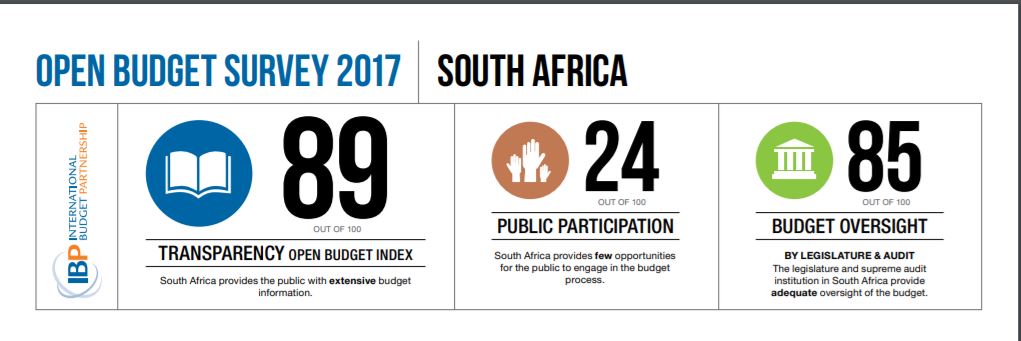 Researchers Sanjeev Khagram et al suggest that public interest in transparency, participation and accountability in fiscal decision-making has seen sharp increases globally. They cite various reasons for this increase. One is a shift from, “closed, authoritarian political regimes to … ones characterised by policy contestation, separation of powers, political party competition, an organised civil society, an engaged citizenry, and an active media”. Nothing to dispute there. The evidence abounds even in the face of a closing civic space.
Researchers Sanjeev Khagram et al suggest that public interest in transparency, participation and accountability in fiscal decision-making has seen sharp increases globally. They cite various reasons for this increase. One is a shift from, “closed, authoritarian political regimes to … ones characterised by policy contestation, separation of powers, political party competition, an organised civil society, an engaged citizenry, and an active media”. Nothing to dispute there. The evidence abounds even in the face of a closing civic space.
Another is the introduction of modern public finance management systems and progressive decentralisation of powers to subnational levels of government including the power to raise, allocate and spend public resources.
Notably, the lack of transparency and disclosure by governments of their financial risks is cited as a contributing factor in many countries’ fiscal crises, highlighting the importance of openness.
The proliferation of norms and standards calling for greater transparency and (public) participation in all government matters is another reason.
One such global standard is the International Budget Partnership’s Open Budget Survey (OBS). The survey is the world’s sole independent measure of fiscal openness. The OBS assesses 115 countries on the transparency of their budgets, measuring the expanse and timeliness of budget information that they make public. Countries are scored between 0 and 100 and ranked on the Open Budget Index (OBI). The survey applies 109 equally weighted indicators to measure transparency. These indicators assess the availability of eight key budget documents. This includes determining whether these are accessible online, in a timely fashion and the extent of their comprehensiveness and usefulness.
The next OBS is due for release in April 2020 (it’s a pretty big deal in open budget circles).
In the last 2017 OBS released in April 2018, South Africa was ranked “top of the pops” at 89 out of 100.
Regional neighbours Tanzania, Mozambique, Zambia and Zimbabwe scored 10, 41, 8 and 43 out of 100 respectively. On 26 February 2020, Minister of Finance Tito Mboweni will table two of the eight budget documents that the OBS assesses every two years.
However, the last OBS also warned that there was a need for South Africa to safeguard its hard-won transparency status following post-apartheid budget reforms. How? Among other things; by ensuring that the integrity of institutions such as the South African Reserve Bank (SARB), National Treasury and South African Revenue Services (SARS) are protected and bolstered. That recommendation was made against the backdrop of emerging state capture revelations.
The OBS results to be released in April 2020 will take into account changes introduced since 2018. And while the survey won’t take Budget 2020 into account – the minister’s statement should tell us a lot in the interim.
In his gloomy October 2019 Medium Term Budget Policy Statement, Mboweni signalled Treasury’s assent with the need to bolster state capacity;
“The state can use its budget better … Where possible, given budgetary constraints, government is shifting resources to areas that urgently need to strengthen capacity. … the National Prosecuting Authority receives an additional R1.3-billion, and the South African Revenue Service receives an additional R1-billion for the next two years. These funding shifts will bolster efforts to combat corruption and improve revenue collection … National Treasury has reviewed the procurement regulatory framework and developed a Public Procurement Bill.”
On the last point – the Procurement Bill – many were sceptical about whether this fabled bill would ever see the light of Parliament. On 19 February 2020, the National Treasury announced that the Bill had been tabled for public comment.
So does it matter how much budget information activists, parliamentarians and the public have access to? Maybe yes. Maybe no. The OBS also called for more information on the government’s financial position to be made available in the budget proposal tabled in February each year. It remains to be seen how much of that will be revealed in Wednesday’s Budget.
Perhaps another question relates to the impact of high levels of fiscal transparency on the bottom line; improved public resource governance and accountability? How do countries like Zambia with dismal transparency scores (and access to information legislation enacted as recently as 2019), compare? Is it possible (or fair), to make such comparisons? Members of the social accountability community of practice likely have a lot to share. And share we must.
There is also a lot to be said for gains in transparency for transparency’s sake. Embedding transparency and proactive disclosure in legislation is not necessarily the silver bullet we may sometimes assume it to be. But it is important and empowering.
Without dismissing the serious obstacles to accessing budget data in many other African countries; actual political and technocratic support is just as important an enabler of meaningful transparency.
We need officials, policy-makers and legislators alike who genuinely appreciate the need for transparency. Without that, the Collaborative Africa Budget Reform Initiative (CABRI) asserts that even significant technical reform will not result in real improvements in external transparency.
So through all the cacophony on Wednesday, 26 February, I’ll be listening to hear whether Mboweni genuinely sees fiscal transparency as a cornerstone in building the kind of capable state he seems so committed to. DM/MC
Zukiswa Kota is a programme manager at Rhodes University’s Public Service Accountability Monitor (PSAM), a network member of the Global Initiative for Fiscal Transparency (GIFT), Budget Justice Coalition and lead of the Imali Yethu Coalition in South Africa. Twitter: @ZukiswaKota


















 Become an Insider
Become an Insider